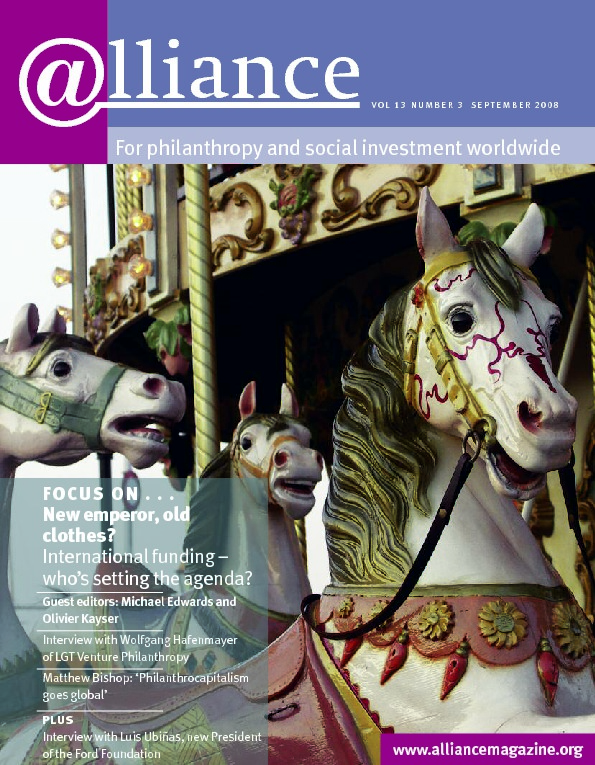Philanthropy is nothing if not voluntary activity. Donors, by definition, are not compelled to give to the public good. They do so from their own private motives. The world is a better place because of private generosity.
Recognizing the benefits of such private generosity, philanthropy is encouraged by public policy in many countries, and the flows of funds are often amplified from favourable tax treatment. Yet donors are not responsible to the public-at-large as governments are (at least in theory). The question thus arises of how much control donors should have in directing philanthropic funds. Should Leona Helmsley’s $8 billion bequest for the support of dogs have been eligible for tax benefits? Large foundations can out-spend local and regional governments in many cases. Many critics argue that a large proportion of philanthropic spending, whether personal or corporate, benefits those who are already privileged, with only a small amount benefiting the poor and marginalized. Put another way, who decides what is philanthropy and what is self-interest masquerading as philanthropy? If government defines philanthropy narrowly, will private donors give less money voluntarily? Does giving near carte-blanche to donors to choose what causes to support perpetuate privilege and self-interested giving or does it allow private philanthropy to lead the way on unpopular causes or issues that governments often ignore (such as the role private philanthropy played in drawing attention to HIV/AIDS, FGM and landmines, for instance). Tim Ogden
 In favour of more donor freedom
In favour of more donor freedom
Chocolate eggs for Swiss nuns?
Michael Alberg-Seberich and Aletta von Meibom
In our search for the most obscure charitable foundation this is one of our favourites. A Swiss foundation states its (tax-exempt) purpose as enabling mountain peasant families and single peasant women from the cantons of St Gallen, the two Appenzell, and Glarus to visit the Circus Knee; providing the nuns and the priest of the local Cistercian Monastery at Easter with one Schoggi-Chocolate Easter Egg filled with 300g of candies each.
 If this isn’t enough to raise questions about unrestricted donor intent, consider that 46 per cent of respondents to a new study on current trends in philanthropy[1] felt their charitable donations had a ‘greater impact on their own personal fulfilment’ than on those who receive their gifts.
If this isn’t enough to raise questions about unrestricted donor intent, consider that 46 per cent of respondents to a new study on current trends in philanthropy[1] felt their charitable donations had a ‘greater impact on their own personal fulfilment’ than on those who receive their gifts.
Should tax-exempt status be awarded to all donations? Would it not be better to set more rigid boundaries for private giving that align investments with the public interest instead of allowing, for instance, Leona Helmsley to give an estimated $8 billion to dog charities?
But, to come clean, we are in favour of donor freedom. We will tell you why and then add some ‘buts’.
For donor freedom
First, let’s look at the roots of philanthropy. Why does the state transfer a part of its decision-making power to the private donor at all? At the heart of this lies the idea that in a pluralistic society the individual can come up with ideas for solving problems that will not cross the public mind … the state after all doesn’t know it all. And if we were to compile a list of misguided state investments (using taxpayers’ money), it would be quite impressive.
In addition, while politicians, with re-election in mind, might prefer popular issues, foundations can take a longer view. For example:
- In 1991, when the US government didn’t want to fund research on sexual behaviour, a couple of foundations led by the Robert Wood Johnson Foundation funded a survey on sexual behaviour and its relationship to public and individual health. The study was instrumental in the fight against HIV/AIDS.
- The Carnegie UK Trust’s work on young people’s participation showed an increasing alienation of the young from politics. It documented a crisis in British democracy. The report of the Carnegie Young People’s Initiative made many recommendations that were subsequently adopted by the government.
 Last but not least, a lot of private money would simply not go into the sector if there wasn’t the freedom to invest it where the donor chooses. The German entrepreneur and philanthropist Florian Langenscheidt speaks for many entrepreneurs when he says: ‘There is so much we can do more efficiently, pluralistically and better [than the state].’ In his opinion every ‘private’ euro spent is as efficient as three euros spent by the state.
Last but not least, a lot of private money would simply not go into the sector if there wasn’t the freedom to invest it where the donor chooses. The German entrepreneur and philanthropist Florian Langenscheidt speaks for many entrepreneurs when he says: ‘There is so much we can do more efficiently, pluralistically and better [than the state].’ In his opinion every ‘private’ euro spent is as efficient as three euros spent by the state.
However …
If we are to benefit from the drive and creativity of private donors and foundations, it is also important to limit the probability of extremes such as Leona Helmsley’s donation. Three approaches might help here.
Focus on root causes and be willing to enter unknown territory
Foundations are at their best when they are acting as pioneers, when they are willing to test and re-invent instead of acting as a stopgap for the state. Foundations and donors should trigger issues, develop solutions that can be adopted by other players (including the state), and constantly evaluate where their ‘risk capital’ can create the biggest social return. Admittedly, the higher risk of failure inherent in this approach has resulted in too many foundations playing it safe – and it is to be hoped that more foundations realize that the ultimate accountability lies with the public (and the grantee), not their board.
Improving donor services
We have to support donors who want to do better. In contrast to the US and the UK where you will find a relatively broad range of donor services such as peer networks, advisers and databases, other countries have a much less developed infrastructure. As a recent study by Scorpio partnership has shown, donors and advisers alike are conscious of this need, which will hopefully result in additional resources for the sector in the future.
Strengthening internal and external non-public control mechanisms
The last and perhaps most crucial point is the need for functioning non-public control mechanisms. In 1998, the Wallace Foundation supported partnerships between large and small arts organizations in order to build capacity and expand audiences. An internal evaluation of the programme found that arts organizations were entering partnerships only to obtain grant funds – showing that the Wallace strategy had failed. Instead of sweeping this failure under the carpet, the Foundation published the evaluation. It also added the lessons learned to its grantmaking principles. As an aside, the publication of the evaluation (much downloaded) greatly strengthened Wallace’s reputation in the sector.
Slowly but surely external control is improving as well. In early 2008, the German charity watchdog, the DZI, deprived UNICEF Germany of its so-called Spendensiegel (Charity Seal) after untransparent handling of donations – showing that the big and established organizations can’t rely on their status when it comes to independent third sector control mechanisms.
 Mahatma Gandhi once said: ‘Freedom is not worth having if it does not include the freedom to make mistakes.’ In the end we think that a pluralistic, risk-taking donor culture can be an asset to all democracies. And hey, who wouldn’t like a chocolate egg once in a while?
Mahatma Gandhi once said: ‘Freedom is not worth having if it does not include the freedom to make mistakes.’ In the end we think that a pluralistic, risk-taking donor culture can be an asset to all democracies. And hey, who wouldn’t like a chocolate egg once in a while?
1 Conducted in 2008 by the Center on Philanthropy at the University of Indiana and the Bank of America.
Michael Alberg-Seberich is Executive Partner, Active Philanthropy. Email alberg-seberich@activephilanthropy.org
Aletta von Meibom is project manager. Email meibom@activephilanthropy.org
Tax benefits in Germany
Foundations with headquarters in Germany can have their taxes reduced if they pursue qualified philanthropic purposes – public benefit purposes, benevolent purposes, and the support of churches. Organizations must use the income from assets exclusively to pursue these purposes, but they are allowed to build reserves of up to one-third of the annual income from capital investment. For both individual and corporate donors, donations of cash, assets and any other economic goods except rights of usage and specific performances can be deducted up to a ceiling of 20 per cent of yearly taxable income. In addition, if they contribute to the endowment of a foundation, individual donors can deduct up to €1 million over a period of ten years. A donation by a corporation can be deducted only for the following five years.
For more information
http://www.efc.be/ftp/public/eu/CountryProfiles/germany.pdf
 In favour of more state control
In favour of more state control
Why attach tax benefits to the support of state policies?
Fernando Rossetti
The roles of state, business and civil society have been changing. In the 1980s and 1990s, with the fall of the Berlin Wall and the dissemination of an ideology that came to be known as the Washington Consensus, or neoliberalism, Latin America saw a wave of ‘small state’ policies, and the promotion of a global free market and NGOs. This was followed by a backlash and the consequent overturning of many of these policies.
In Brazil in the early 1990s, it was frequently said that, since the state was so big and incompetent, some social services should be delivered by the private sector or by NGOs. Brazil’s post-military 1988 Constitution established tax immunity for many organizations, including businesses that worked with education or health. The number of foundations and non-profit organizations tripled in only ten years (from 105,000 in 1995 to 348,000 in 2005). Latin American governments also privatized many sectors – energy, telecommunications, highways, etc.
Similar to what is happening in the financial sectors of the US and Europe today, this small state, free market approach provoked a wave of opposing policies in the 2000s. One by one, the biggest economies in Latin America elected more left wing or ‘big state’ leaders, as in Argentina, Bolivia, Brazil, Ecuador and Venezuela. Some businesses were again nationalized and the granting of tax benefits tended to be much more controlled.
The embracing of these two ways of seeing the roles of state, business and civil society in a relatively short time produced contradictory legislation regarding tax benefits for public-oriented organizations in many countries. In Brazil, one set of laws was voted in the 1990s and another set has been promoted in the last few years, many with conflicting underlying visions.
It is in this context – and in the light of the still very serious social and economic challenges faced by the region – that one has to consider tax incentives and exemptions. When should the state promote the use of public money by privately run organizations? That is, when should society give tax benefits for the activities of foundations, NGOs, individuals, families or even businesses (as is frequent in Brazil)?
At GIFE, the Brazilian association of private foundations, we believe that tax incentives and immunities are a powerful tool for the state to engage society in the development of public policies. Some social, environmental and economic challenges have become so complex that state-led actions alone are insufficient to overcome them, and in these cases governments can use tax benefits to foster participation.
A good example of this is the legislation approved in Brazil in 1990 establishing the children and adolescent rights system. According to the Children and Adolescent Statute, ‘it is the duty of the family, the community, society in general and governments to assure, with absolute priority’ the rights of children and adolescents. To this end,
the Statute created funds, at municipal, state and federal levels, to receive donations from individuals and businesses – and allowing them to deduct the amount donated from the income tax owed (up to 6 per cent of taxes owed in the case of individuals and 1 per cent for businesses). The resources from these funds are channelled to NGOs that work with children and teenagers, through selection processes presided over by Children and Adolescent Rights Councils, composed of state, business and NGO representatives. These councils are also responsible for establishing the public policy guidelines for the sector.
This is the central issue: tax benefits make no sense if they are not attached to a public policy, to a systemic view of change or advancement of a sector. If there is one agreed role for the state in societies, it is the establishment of this kind of systemic view, which might include not only the actions of the state itself, but also those of civil society organizations and businesses.
In the case of child and adolescent rights in Brazil, the possibility of people and organizations choosing where to allocate public money – through tax incentives – has not only raised public awareness about the related public policies but also strengthened social control mechanisms in government-run programmes.
Perhaps the main problem in Latin American governance – and in most developing countries – is that there are government policies rather than state policies. Each government has its own policies, and every election raises the risk that the actions of the previous one will be discontinued. When policies are thus associated more with a particular government than with the state, two serious problems ensue. First, short-term approaches are adopted which are inadequate to deal with challenges that require the long-term commitment of society. Second, and more pertinent to the present discussion, a serious problem with tax benefits arises. If it is desirable to have the participation of other sectors of society in meeting the long-term challenges facing a country, it is essential to have established state policies that attract the non-state resources that will qualify for tax exemptions.
Fernando Rossetti is Secretary General of GIFE. Email rossetti@gife.org.br
Tax benefits in Brazil
In Brazil, tax benefits depend on an organization’s activities, rather than the nature of the organization itself; therefore, non-profit organizations per se do not necessarily enjoy exemption. Where an organization’s activities are eligible, individuals and businesses can deduct the amount donated to it from the income tax they owe. This can apply to for-profit as well as non-profit organizations. The Brazilian Constitution stipulates that local or national governments cannot tax educational and social assistance non-profit private legal entities, though this exemption applies only to those assets, income and services related to the organization’s essential activities. To be granted other tax benefits not stipulated in the Constitution, a non-profit entity must be recognized by government as of public interest and must provide donations in specified areas such as culture, children and adolescents, and sports.
For more information http://www.usig.org
 Charles Keidan Tax incentives don’t improve the quality of giving
Charles Keidan Tax incentives don’t improve the quality of giving
It would be invidious for a state to provide tax exemptions to donations based on whether they are aligned to public policy objectives, not only because public policy priorities in a democratic system shift between electoral cycles but also because the idea of philanthropy is to provide a mechanism for people to express support for competing definitions of the public good.
But the status quo is also an imperfect arrangement. It fails to distinguish between charity and philanthropy and treats all charitable giving in the same way irrespective of whether one is using a methodological or analytical framework to make informed charitable investments or simply responding to a mass marketing or fundraising appeal.
If removing tax benefits forestalled the accusation that charitable donations are simply the pursuit of self-interest or self-indulgence by other means, then perhaps this would be a price worth paying. Tax incentives may contribute to increasing levels of giving but they do nothing to improve the quality of giving. Conversely, removing tax incentives could lead to an increased focus on improving the quality of giving. Would we be willing to trade a smaller charitable sector for a better use of existing resources?
 Rana Sadik Donor intent is for secular societies
Rana Sadik Donor intent is for secular societies
Donor intent is a very controversial subject in the Middle East, with Islamism and progressive liberalism providing contrasting perspectives. On the one hand, if you fund Islamic activities, there is a large question mark from the Western world that this may be for funding activities deemed as belligerent or inciting violence. On the other hand, if you fund liberal issues, the Islamic community may deem this as transgressive of sharia law, which leaves a lot of room for interpretation. Governments carefully monitor the funding of progressive issues. Someone who tried to fund a liberal arts programme for schools, which involved some nudity in Italian Renaissance paintings or any literature with sexually explicit content, could be jailed for this. So donor intent and sharia law do not mix. Donor intent is for secular societies.
In any case, Islamic funding is difficult to monitor because Muslim people believe that ‘your left hand should not see your right hand’ when you give.
Persche ruling opens door to tax relief on cross-border donations in EU
Following a European Court of Justice (ECJ) ruling in January, charities in EU countries will be able to benefit from tax relief on donations from anywhere in the EU. In a test case brought by a German donor, Hein Persche, the ECJ ruled he was entitled to the same tax relief on a donation to a Portuguese charity as he would be if he were giving within his own country. The ruling will mean a change in the law in most member countries, where tax relief is currently given only on donations to domestic charities. However, tax relief will be conditional upon the beneficiary charity being recognized as such under the laws of the donor’s country. ‘Something that is a charity elsewhere in Europe may not qualify in the UK,’ says Clive Cutbill, head of international philanthropy at UK law firm Withers. He added that the Dutch government has created a register of approved foreign charities, a move that other EU governments may find it convenient to follow.
Source
Third Sector Online, 28 January 2009





Comments (0)